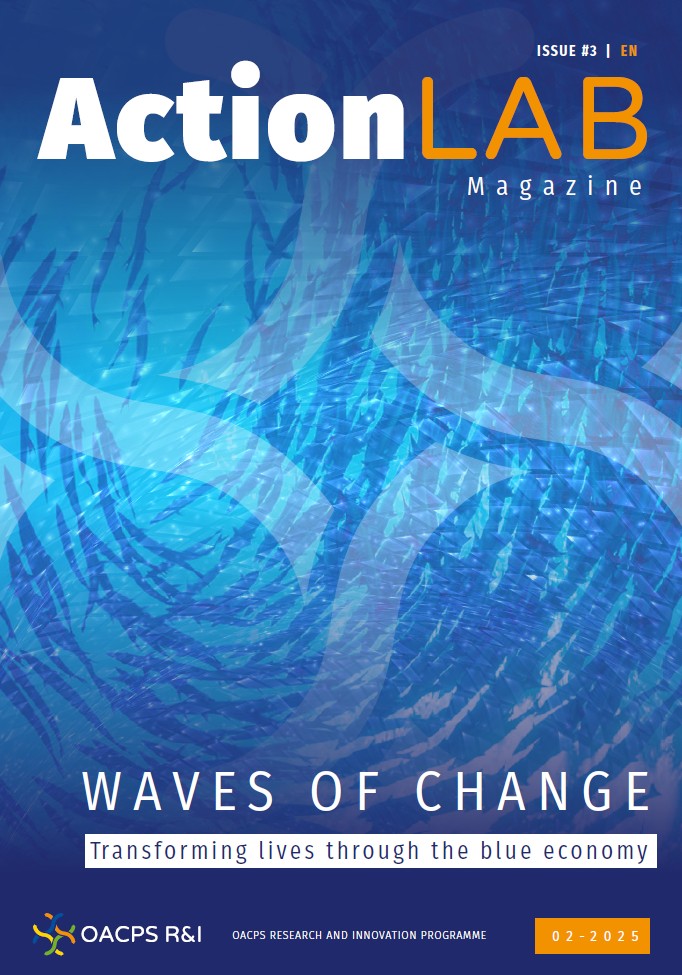
Enhancing Research and Innovation ecosystems to tackle climate change in the Pacific 15 – 17 October 2024 | Nadi | Fiji
Executive summary of the October RERIPA event
Four main objectives were expected for the 2024 October Event:
- Present the respective achievements state of the Third Parties Projects (TPPs) selected from RERIPA Call 1, Call 2 and Call4.
- Present the first results obtained by the 5 Living Labs selected from Call 3.
- Bring together all RERIPA project leads and consortium partners from Calls 1 – 4 in order to better coordinate complementary activities.
- Share the initiatives which were already driven and suggest the expected future actions to be set for a consolidated network of stakeholders in the Pacific.
The 3-day event was dedicated to presentations from the eight RERIPA Third Parties Projects (TPPs) selected in response to the 4 calls (https//:reripa.com). Each TPP presentation included a general overview, an update on progress, activities to date and upcoming achievements, followed by a Q&A discussion. In addition, two conferences were organized. They focused respectively on the institutional vision of USP’s regional and global approach to research and innovation in the Pacific, and on innovation in the Pacific Islands from a social, economic and geographical perspective. Two internal sessions were also proposed by the OACPS-TAU (Technical Assistance unit). The first was dedicated to projects finance management ; the second session was dedicated to improving / clarifying the Project’s “Logical Frameworks”.
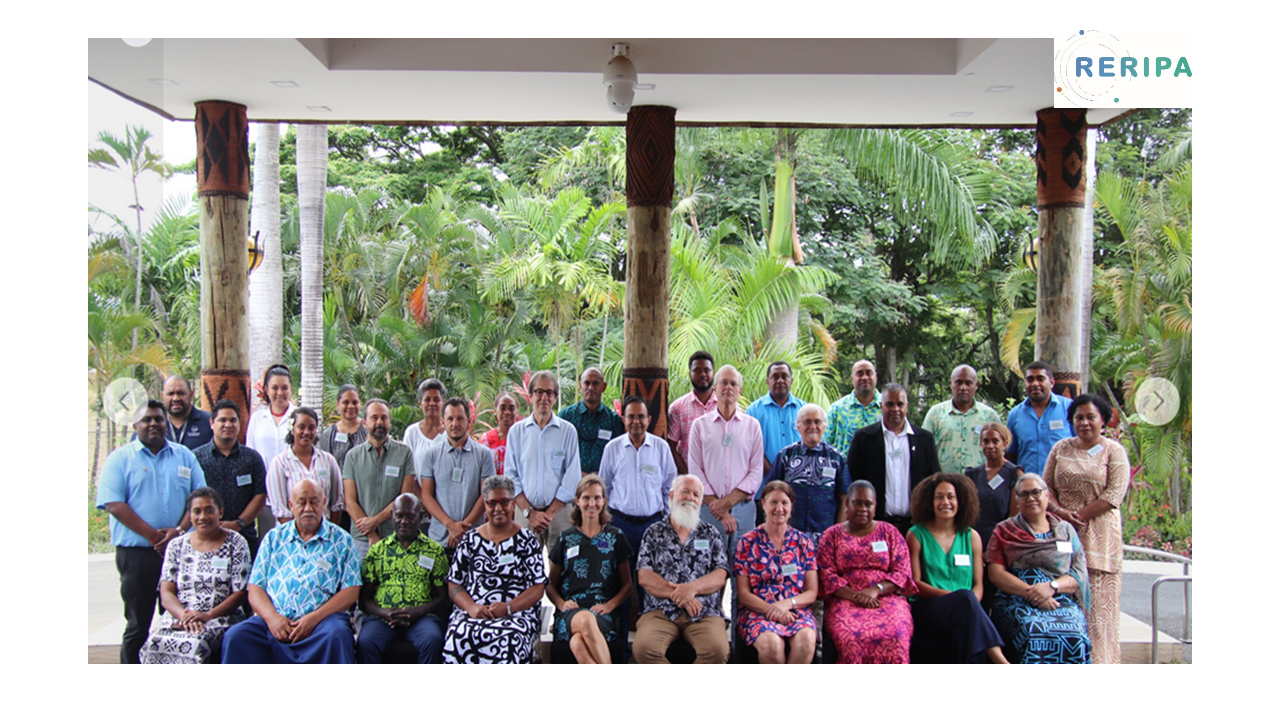
The concept note of the October Event 2024 Workshop can be found in Annex and on the Agenda tab of the RERIPA website at https://reripa.com/event/reripa-event-15-17-october-2024-tanoa-international-hotel-nadi-fiji/
- The 8 selected projects from the RERIPA Calls for proposals,
- Institute of Research for Development (IRD)
- Pacific Islands Deveopment Forum (PIDF),
- Vanuatu Meterology and Geohazards Department (VMGD),
- Organisation of African, Caribbean and Pacific States (OACPS),
- Other skateholders from the R&I ecosystem of the Pacific Region
PARTICIPANTS
Note: The CMT thanks Henri Galuvakadua and Leba Salusalu (PIDF) for the minutes of the 3-day workshop.
Day 1
Opening Remarks
Representative from the Delegation of the European Union for the Pacific – Ms. Roxane Castelein
- The European Union (EU) acknowledge the importance of the RERIPA project as a good opportunity for Pacific countries to reinforce their research and innovation frameworks and produce local innovations to help prevent the effect of climate change.
- Climate change and its impact across the region is a major concern and a priority in the EU cooperation. Ongoing EU projects focus on measures supporting our counterparts in the fight against climate change as they are recognized as the single greatest threat to the people of the Pacific.
- EU is committed to support the most vulnerable, in particular the Least Developed Countries (LDCs) and Small Island Developing States (SIDS) in adapting to climate change effects.
- The alignment between RERIPA’s efforts and the EU’s priorities is clear, especially in the areas of climate action and resilience. Through initiatives like the European Green Deal, the EU is committed to addressing climate change on a global scale, recognizing that the impacts of climate change and biodiversity loss transcend borders.
- RERIPA shares the same goals as the EU on ambitious climate action implemented with respect for human rights, the rule of law and inclusiveness towards all vulnerable groups. RERIPA also contributes towards the Samoa Agreement and EU Indo-Pacific strategy.
- The EU recognizes RERIPA’s strong contribution to the EU-Pacific Green-Blue Alliance’s goals to enhance climate mitigation, adaptation and resilience.
University of the South Pacific – Professor Sushil Kumar
- The RERIPA project is a consortium that includes academic as well as NGOs and non-academic organizations. In academic, they have the University of the South Pacific, National University of Vanuatu, National University of Samoa, Fiji National University, and Solomon Islands National University working together. It’s the first of its kind of project which has bought all these regional and national universities together over same platform with same goal.
- Consortium-based projects have the opportunities of working together and utilizing their capacity to achieve the same aims and objectives but also have the challenges and difficulties. The challenges in this sense bring the organizations together, realizing their particular potential and using those for common aims.
- One of the difficulties with RERIPA projects has been the limitation of the maximum funding which one organization can use, and this has particularly impacted USP leading call 1 and call 2 and three living labs. In the other hand, there has been in-kind contribution to RERIPA projects from partner universities and in particular by USP. An effort has been made by USP to largely reduce the overhead charged to RERIPA although the important financial responsibility endorsed for these projects.
Overview of RERIPA in 2024
https://docs.google.com/presentation/d/1sFPMdwIwaLw4qAysGqkZ8C61MCnzj32i/edit#slide=id.p5
by Mr. Roneel Kumar (CMT) and Call Lead Applicants
- The severity of the consequences of climate change on the living conditions of Small Islands Developing States (SIDS) has led Leaders to place priority on a well informed and coordinated response to CCI (Climate Change Impact).
- The RERIPA project (coordinated by IRD, PIDF, PIANGO and VMGD) is implemented collaboratively by engaging with relevant stakeholders involved in the Pacific R&I ecosystem (academic institutions, civil society organizations, government bodies, startups and spin offs).
- RERIPA outputs include:
- i) consolidating Research and Innovation (R&I) ecosystem with a focus on climate issues in the Pacific region;
- ii) strengthening regional networks and contributing to national or regional R&I strategies to better develop innovative processes with a focus to CCI;
- iii) stimulating the co-construction of “Living Labs” to be able to generate, apply and transfer knowledge to better address CCI and increase uptake in the region of innovative, inclusive and sustainable solutions to deal with regional CCI.
- Before a deeper presentation of each of the projects in the dedicated sessions, the objectives of the 8 projects were briefly presented with two slides by each Lead Applicant.
RERIPA Call 1 – Mapping of R&I ecosystems, networking facilitation, shared R&I vision (with a focus on climate change)
https://docs.google.com/presentation/d/1sI4HBudetUaFWTnxoXrj2WkH1LgIShFs/edit#slide=id.p1
by Mr. Albert Whippy and Prof. Maurizio Cirrincione, USP
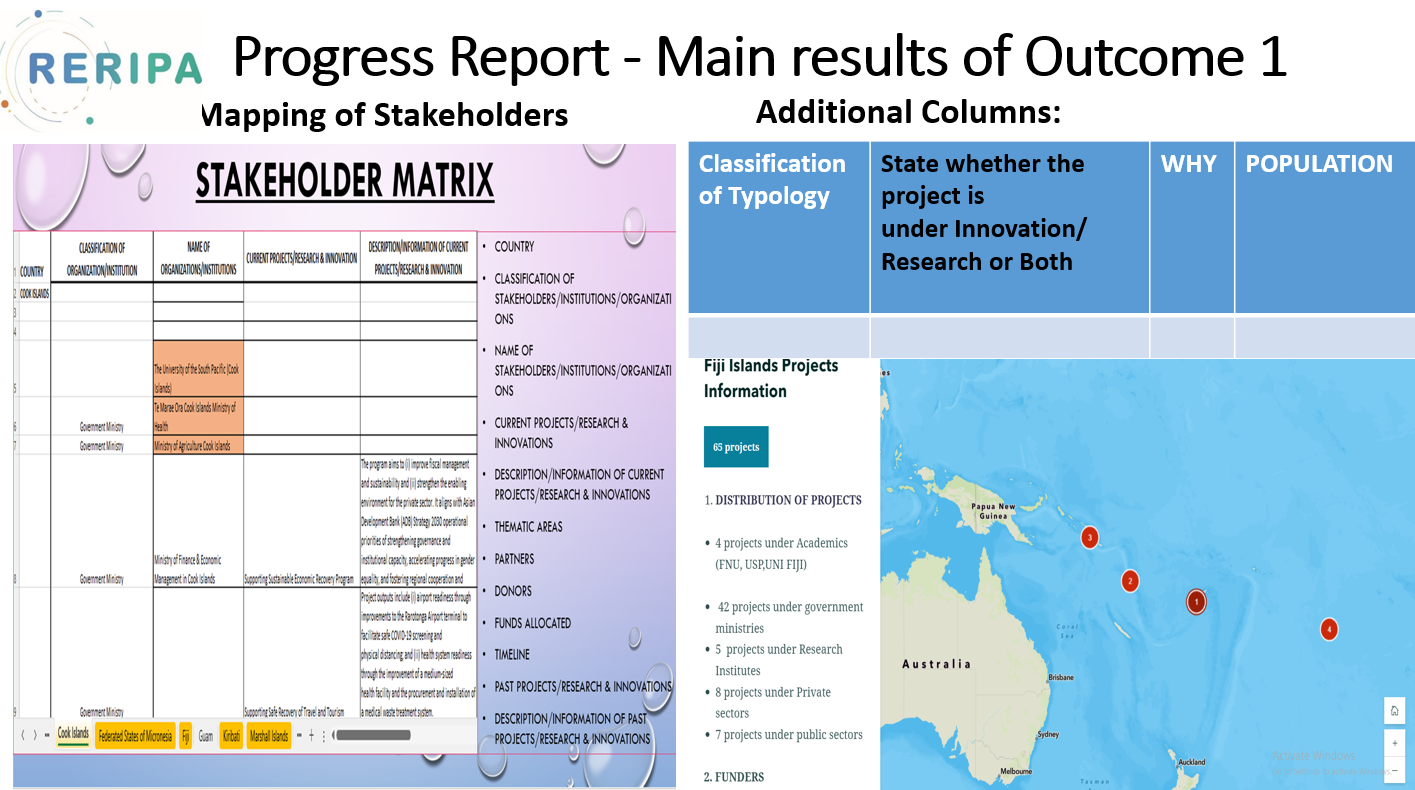
Led by the University of the South Pacific, this project aims to map the research and innovation landscapes in the ACP countries of the Pacific Region, to map the actors and understand their interactions, in a perspective of collaboration and strategic development. Surveys on the innovation ecosystem and on the involvement of stakeholders in the study of the consequences of climate change, have been carried out and are being processed. The delay is explained in particular by the evolution of expectations and the realization of additional activities at the request of the consortium, to improve the quality of the studies/results (the questionnaires which were initially sent electronically, were completed by face-to-face meetings). The Logical Framework is being revised with the support of Gérard Denouden, with a view to clarifying the programs of activities and their possible evolution as a result of the extension of the project.
RERIPA Call 2 – Capacity Building in Innovation and Valorization
https://docs.google.com/presentation/d/1KwNW7b-MrhcpcoktpDwlbfCc6DgFCfWA/edit#slide=id.p1
by Mrs Elenoa Ravula and Dr. Awnesh Singh, USP
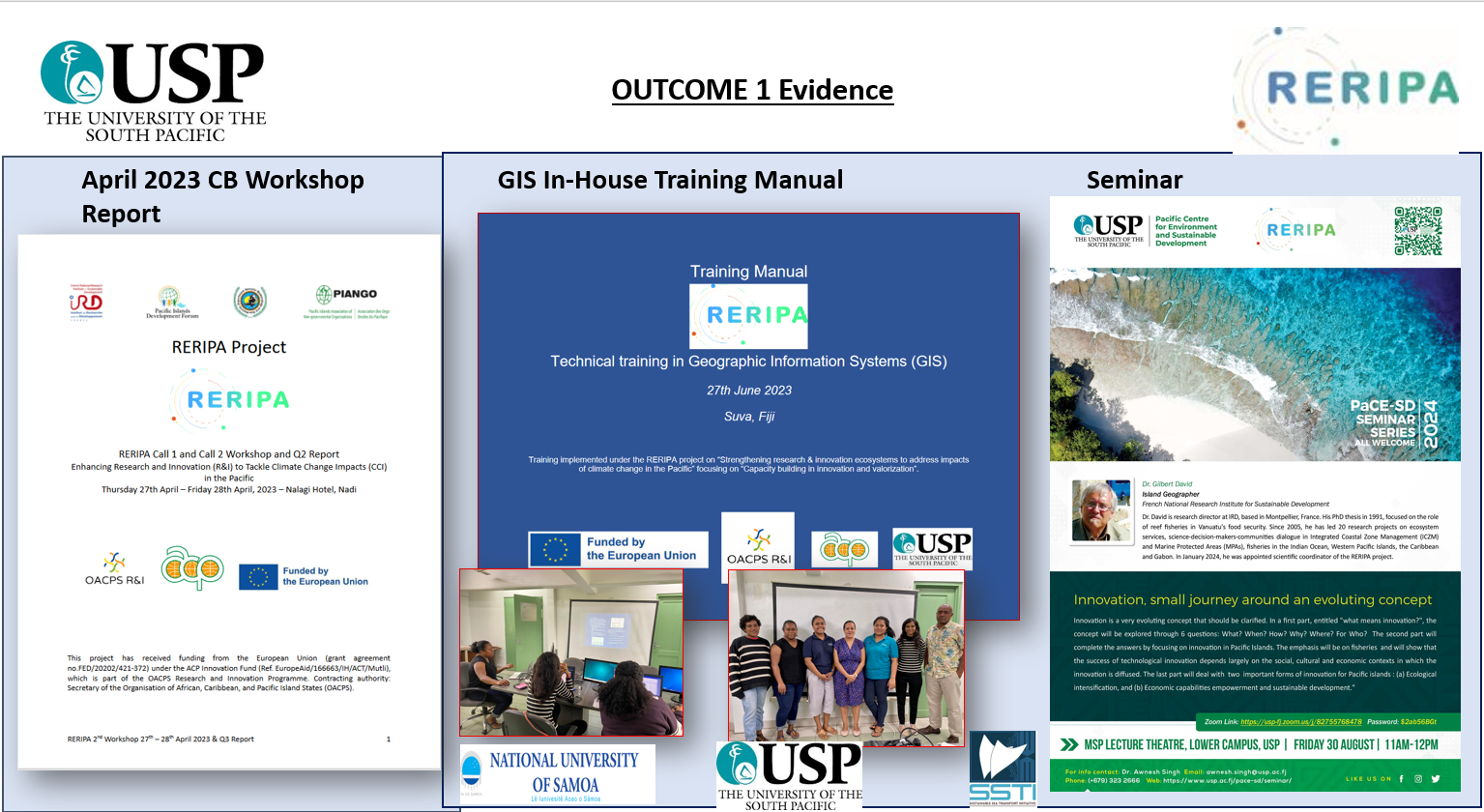
Led by the University of the Pacific, this initiative aims to train stakeholders in project engineering, open innovation, and other key areas to strengthen Living Labs and research ecosystems. Multi-stakeholder workshops were organized with partners. RERIPA was able to benefit (thanks to a member of its advisory board) from a UNI-MERIT – https://unu.edu/merit training (United Nations training structure) training for decision-makers: how to carry out an innovation strategy at the local and regional level: online course on the whole of Asia Pacific, with the participation of RERIPA (participants received materials that they can share). It is planned to offer this training again in the last year of the project targeting a wider audience. One idea to explore could be the creation of a MOOC in collaboration with the IRD, by adapting the content to the Pacific. RERIPA was able to join the training for researchers. which took place in Suva (Fiji) on the setting up of projects. as part of the APN – Asia-Pacific Network for Global Change Research. Several RERIPA agents, members of some Living Labs and contributors to Call 1, 2 and 3 were able to participate (Gilbert David, scientific coordinator of RERIPA, contributed as a trainer). This training led by the AFN was the first to be organized in the Pacific.Another training course, for the private sector, to learn how to innovate and manage innovation at the company level, is being organized by RERIPA with the University of Lausanne and the private company “SSTI” based in Suva / Fiji.
Internal Sessions
by Mr. Gérard Denouden (OACPS TAU)
Financial Management. Points were about properly managing finances as a central element of any project, insure that all expenses made by each TPP (Third Party Projects) are eligible and that all eligible expense must be proven via a financial justification. Financial justifications are also proof that the actions planned by each TPP have been carried out.
Logical Framework. Following the general overview of the different Log Frames of the 8 TPPs, which was done during the Workshop session, each of the Logframes was discussed and restructured with Gerard Denouden during specific sub-sessions organized at PIDF by the management team of RERIPA, during the week after the October Event 2024. These Logframes reviews are crucial for clearly describing and agreeing the final work program of each of the 8 TPPs.
Day 2
RERIPA Call 3 – Climate Change Innovation for Coral Reefs
https://docs.google.com/presentation/d/1KqTjA4HIM3rEjhnwgVOLAEEGBmSs6Bp8/edit#slide=id.p1
by Ms Susana Vulawalu, Dr. Austin Kerby, Mr. Tomasi Tikoibua
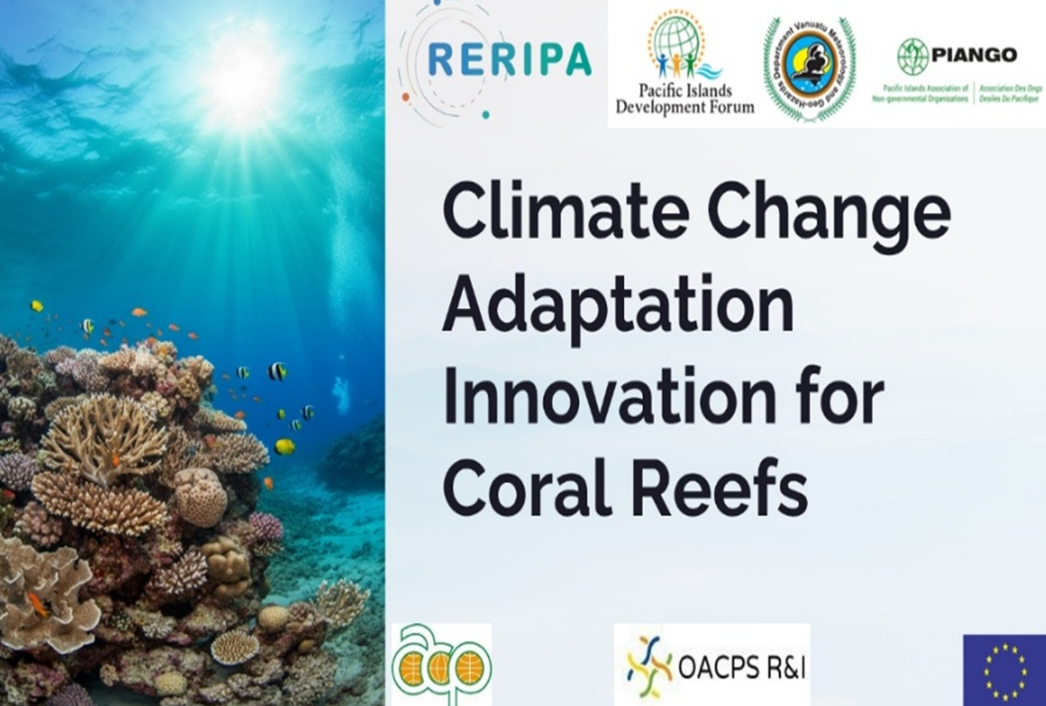
This project, managed by the University of the South Pacific, focuses on developing and implementing innovative strategies to improve coral reef resilience, supporting community conservation efforts.The objective is to identify bleaching episodes, identify resistant corals and transfer them to other areas with more favorable/less stressful situations, and gradually increase their resistance (from 30 to 33 and 37 °C). This project involves a partnership between a private sector and an NGO: Austin Bowden obtained the necessary funding to create the largest coral nursery in the world (seen from the sky) and he made a film with the RERIPA label
Its “Reefs of Hope” initiative is labeled “Ocean Decade” (UNESCO) and serves as an international showcase. RERIPA has had a leverage effect and improves Austin Bowden’s collaboration with the French-speaking world; Austin is looking to expand its area of activity in the French-speaking regions of the South Pacific.
RERIPA Call 3 – Innovative and Sustainable Solutions for Managing Coastal Erosion
https://docs.google.com/presentation/d/1xxFRQkxmdDOhsJf1eowV1UZSBES7joly/edit#slide=id.p1
by Mr. Kelvin Passfield and Mrs. Alanna Smith (Te Ikapurea Society)
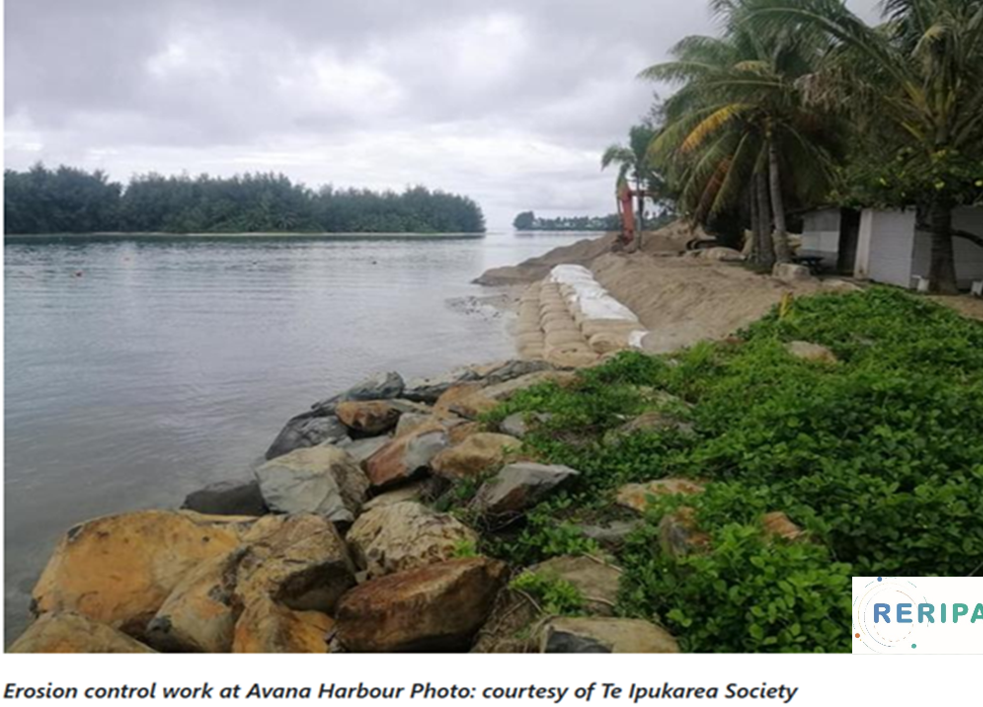
Implemented by the Te Ipukarea Society, this “living lab” focuses on developing eco-friendly methods to combat coastal erosion, safeguard communities and preserve natural habitats. The coordinators of this action carried out a public utility analysis/impact study with the populations and government institutions; the experimental site is determined; the means of action are being acquired. There is a strong connection between the team and the local government. The choice that is made is a geotextile protection (method experimented by Australia and New Zealand) coupled with a nature-based solution, including the planting of shrubs to recreate dunes. It is planned that the project leaders will carry out a state of the art on the different solutions for preventing coastline from erosion, including a critical analysis that will justify the choice made. This Living Lab was visited by RERIPA managers and the PIDF Director of Climate Action.
Conference n°1. Research & Innovation – Institutional View – USP Regional and global approach
https://docs.google.com/presentation/d/1Nr-EqZasJAaZPd_C55xtyk9I_6IP3lUV/edit#slide=id.p1
by Prof. Sushil Kumar
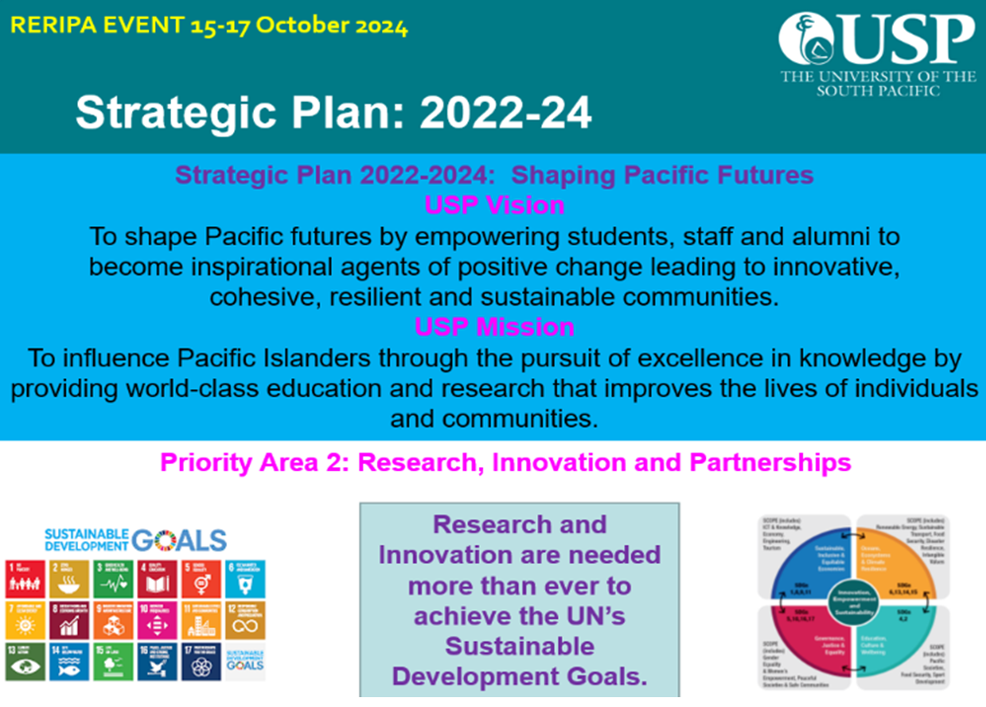
- Oceans are the main drivers of the Blue Economy of the South Pacific Region more than any other region since the livelihood of the people of these Small Island Developing States (SIDS) / Pacific Island Countries (PICS)
- USP is an early expression of regionalism in the Pacific and well embedded through the preceding Pacific Plan and the Framework for Pacific Regionalism;
- Regional university – Owned by 12 Forum countries that determine its policies and work programs giving the University a regional character as the premier provider of higher education and research; USP has 14 regional campuses and 9 centers across its 12 member countries
- USP has activities (education, capacity building and research) that require it to provide advice to member countries on HRD (Human Resources Development) and ICT (Information & Communication Technologies), as WG (Working Groups) lead under CROP mechanism and numerous other regional and academic platforms;
- UP implements region-wide programs that assist with the sustainable development of member countries e.g. PaCE-SD actions, PacREF and other sections of USP in areas of education; ICT, climate change, oceans, disaster risk management, renewable energy, marine and others;
- At the global level, USP SRTs are aligned with international frameworks such as the Sustainable Development Goals (SDGs) 2016-2030 and the 2030 Agenda.
RERIPA Call 3 – Living Lab for a Decarbonized Energy Production in Samoa
https://docs.google.com/presentation/d/1zMZjaZeJOn4pzPntGM5eg3l4avMmZ-3W/edit#slide=id.p1
by Mr. Tupuivao Vaiaso, Mr. Rahul Kumar and Prof. Funemalafai Teama
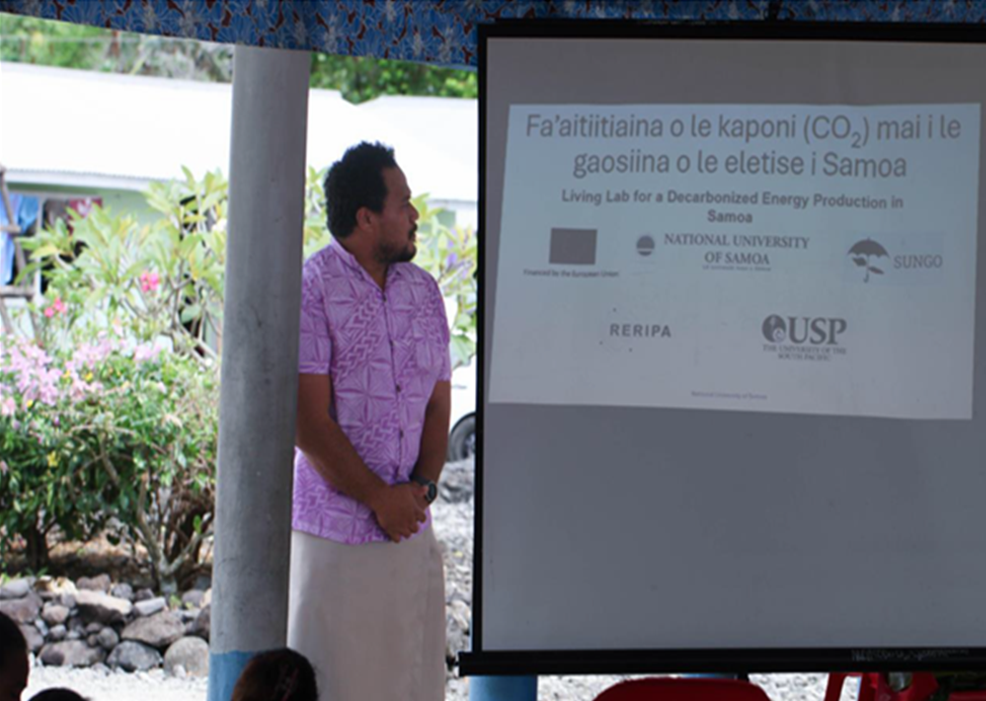
Led by USP and Implemented by the USP Campus of Samoa, this “living lab” focuses on developing decarbonized energy source. The target is to provide clean and renewable energy in remote areas, coupled with a hydrogen system in order to secure energy supply in case of power outage for natural hazards. Uafato Village was selected as a site in Upolu and initial community consultations were completed. The report on the Electrical Appliances Survey and Load Profiles of Uafato is completed. Activities concern constructing and setting up the microgrid, assessing the microgrid’s performance in terms of availability, reliability, and security, implementing a training of community members, particularly women, and conducting a workshop to present the microgrid and design guidelines to local stakeholders in the region.
RERIPA Call 3 – CHANCES Climate Change and the future of Coastal Communities: Transformation of Sociality, Livelihoods and Lifestyles in the South Pacific
https://docs.google.com/presentation/d/1daLV6M7iWsUArzm6s1BYcjsgzYifqbd8/edit#slide=id.p1
by Mr. Arno Pascht, Mrs. Jane Tuilevuka, Mr. Clarence Cheon, Mrs. Mariane Visai, Ass. Prof. Olivier Galy
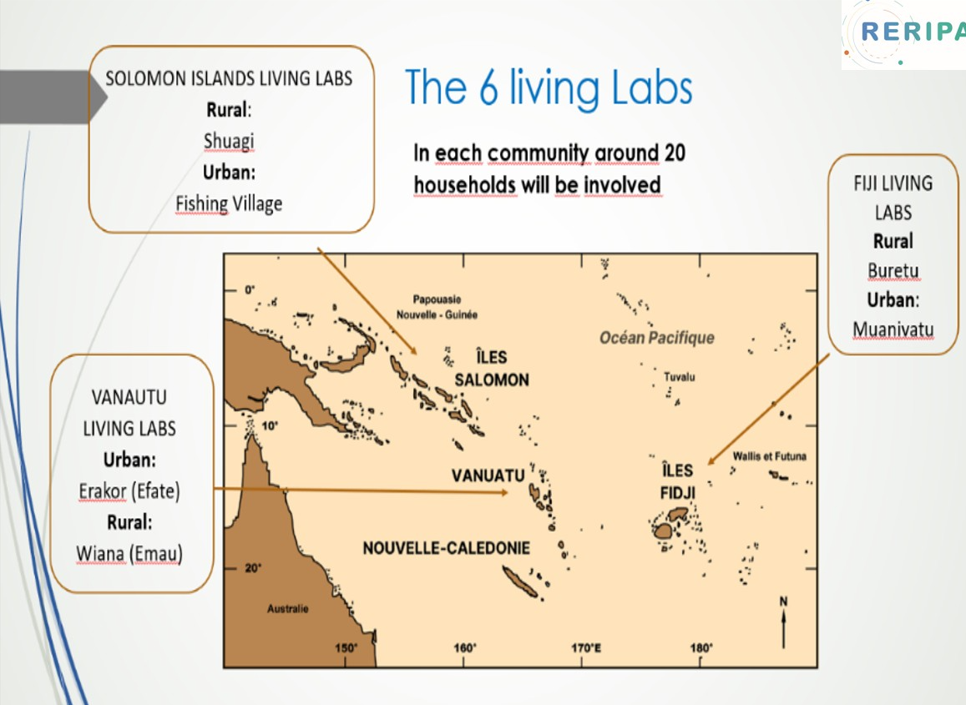
Transforming Sociality, Livelihoods and Lifestyles in the South Pacific (Fiji, Solomon Islands, Vanuatu): This “living lab”, led by the University of the South Pacific, studies the effects of climate change on coastal communities, focusing on food security, family farming and health. This LL is integrated into a larger project, the FALLAH project (RISE, H2020, family farming in the Pacific, led by the University of New Caledonia, involving the IRD; with specialists in agriculture and health, with relays in 5 Australian universities, the USP in Fiji, the National University of Solomon, the National University of Vanuatu): the objective is to improve food consumption, despite crisis situations, to limit health problems (e.g. obesity). Communities have been identified and mobilized, surveys carried out on food consumption and the consequences of climate change. A tablet application is being developed on RERIPA funds. The originality concerns the selection of villages sensitive to flooding and marine submersion in the event of a storm: in a crisis situation, what foods are used and does this emergency food/diet continue after crises (what practices are necessary to move towards a more virtuous diet); It is a question of moving from food security to food autonomy. Schools are involved: students contribute to the collection of information and serve as a relay to their families.
Day 3
RERIPA Call 3 – Pacific Sustainable sea transport for climate Adaptation and Resilience
https://docs.google.com/presentation/d/1WGrDjX3L3SP73T9KhNTO-smkb05WxWdz/edit#slide=id.p1
by Mr. Carl Probert (SSTI) and Prof M. Rafiuddin Ahmed (USP)
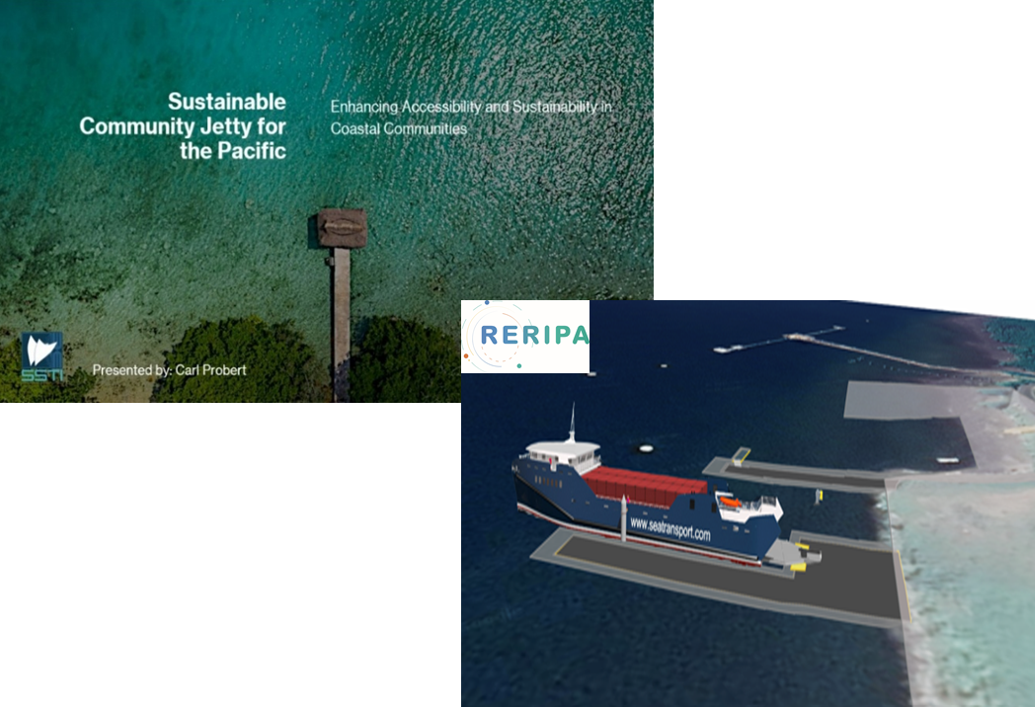
Expected start in 2025, estimated duration of 10-11 months. The project is feasible within 10 months and the subsidy contract can be signed as soon as the extension of RERIPA is confirmed. This project, led by the University of the South Pacific and the Sustainable Shipping Innovation Initiative, focuses on the design and implementation of sustainable logistics approaches to support the development of remote island communities facing climate challenges. The activities take place mainly in Fiji and Tonga. They have already begun (dialogue with communities, identification of needs, feasibility study, community engagement around the establishment of the demonstration site, etc.).
RERIPA Call 4 – Communication and Training Tools & Resources for Enhancing research & Innovation against Climate Change Challenges
https://docs.google.com/presentation/d/1HCO2rKw3csNBPmVI2M9_zeWiIaT2wYej/edit?pli=1#slide=id.p1
by Mr. Ralph Buadromo and Ms. Timaima Racule
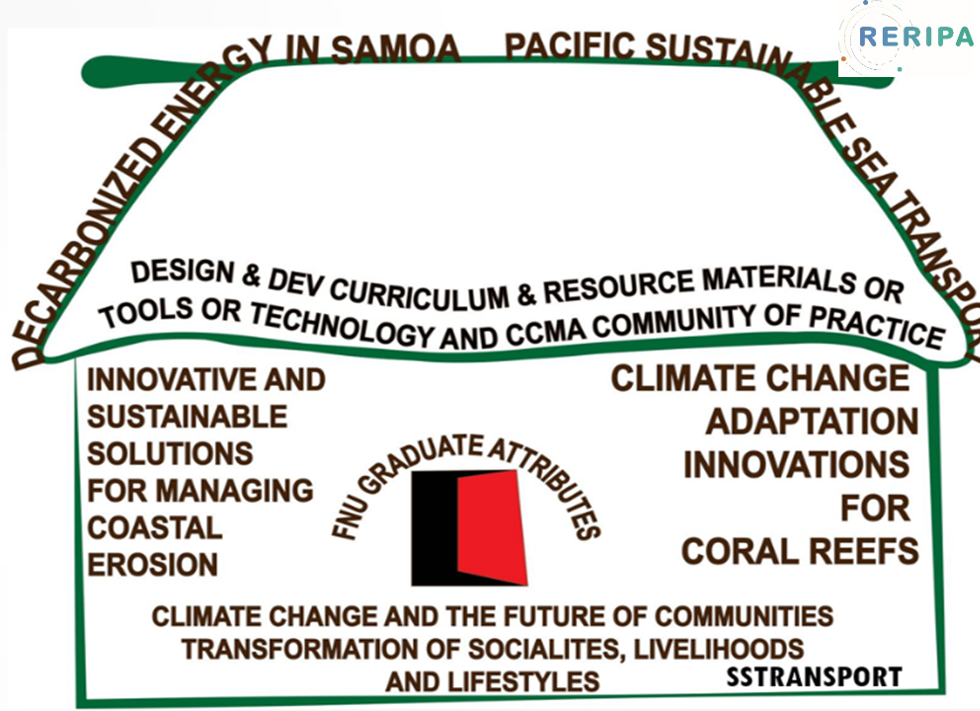
Coordinated by the National University of Fiji, this initiative aims to strengthen educational frameworks by developing tools and resources that enhance research and innovation capacities, specifically targeting the challenges of climate change. All the final productions have been prepared with the Living Labs around their themes and they will take the form of micfrocredentials (units of value that can be integrated into official training courses). These productions will make it possible to promote the work of the community official leaders on the themes that concern them; validation is carried out by a regional entity coordinated by the SPC (South Pacific Community). On the FNU (Fiji National University) site, communities of practice (forum, space for dialogue) have been impulsed, concerning the themes of the different Living Labs (coral, erosion, energy, transport, etc., themes of priority interest for the region), in order to open debates and perpetuate the dialogue following RERIPA.
Conference n°2. Innovation- Perspective of Social, Economy & Geography
by Dr Gilbert David
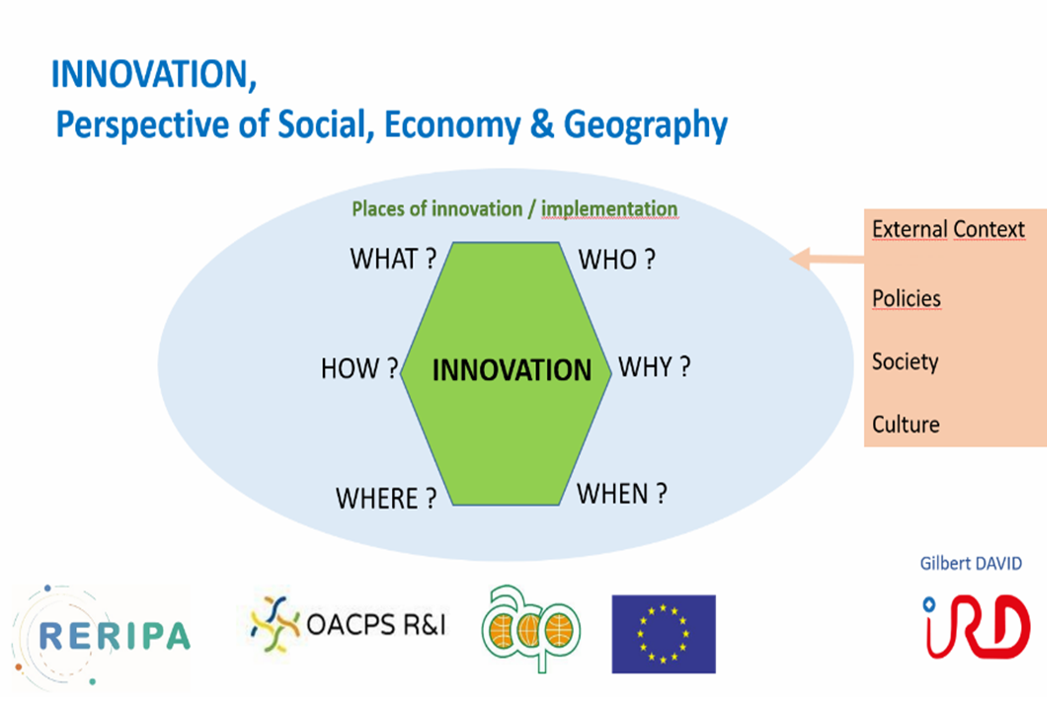
- In terms of Economics, Innovation is a major driver of change in island economies when it meets properly local needs and drives good social acceptance.
- Keys of success of any innovation process in Pacific islands can be assessed by answering 6 questions: What (type of innovation is it: product, method, process, way of thinking) ? Why ? Who (drives or benefits innovation) ? Where (diffusion of innovation)? How (open or closed innovation ? When? (innovation is time driver: expected, sudden or heritage of the past).
- Black pearl in Tuamotu is an example of profitable innovation which drive lessons for sustainability of closed innovation in remote islands.
- Innovation could be seen as a wave that travels from a transmitter to a receiver.
- Social acceptance drive changes in the spatial diffusion of innovation, from expected to unexpected trajectories.
- Merging science and traditional knowledge drive lots of expectation but the second is not only knowledge, it is also a way to see and to think our world.
Participants Interactive Session
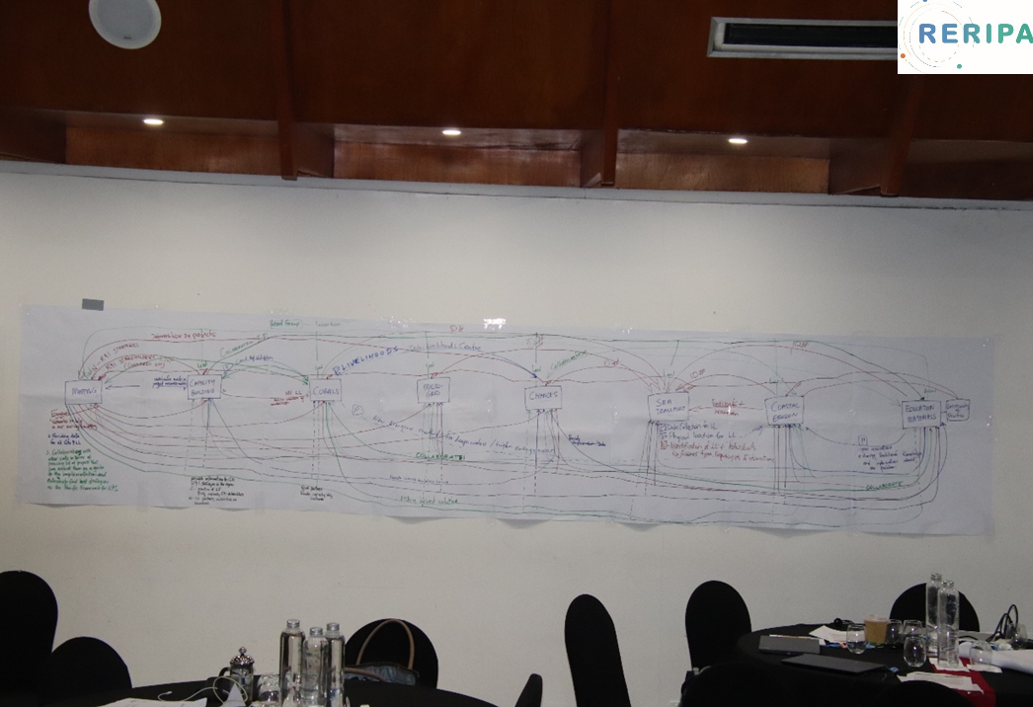
This session allowed a mapping exercice which shows firstly, the interconnectedness of each Call to the other Calls and secondly, the holistic dimension of the RERIPA project. This exercise is in continuity with the session organized during the first October Event (2023, https://reripa.com). It contributes to the reinforcement of the RERIPA network, particularly concerning the Living Labs as interfaces between different contributors (civil society/communities, private sector, government bodies, academic institutions), which could inspire other Living Labs dedicated to other themes related to CCI.
Summary of the closing
RERIPA contributes to demonstrate that the Living Lab model is an efficient and very innovative tool to co-design and implement solutions able to reduce the vulnerability of Small Pacific Islands facing climate change impacts, by bridging scientists, private companies, civil society including communities, and decision makers. In order to achieve its main objectives before the end of the project, a last RERIPA “october Event” will be organized in August 2025.
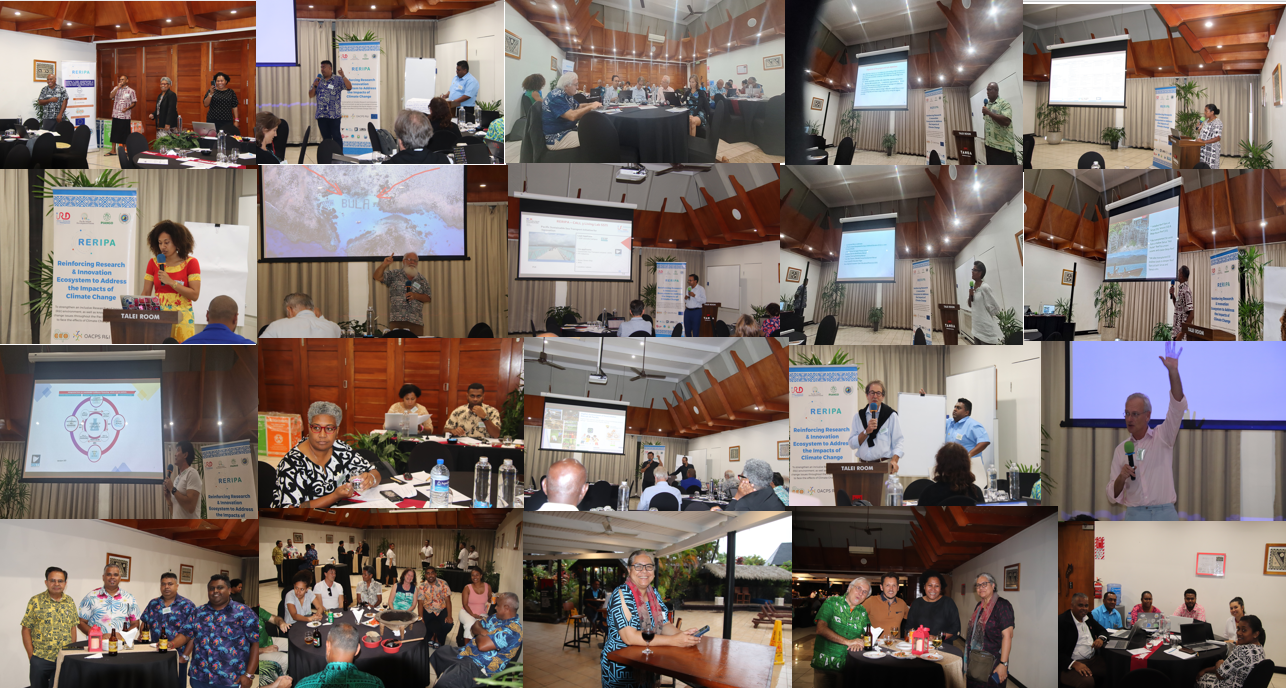
Updated day by day agenda October 2024 RERIPA event

